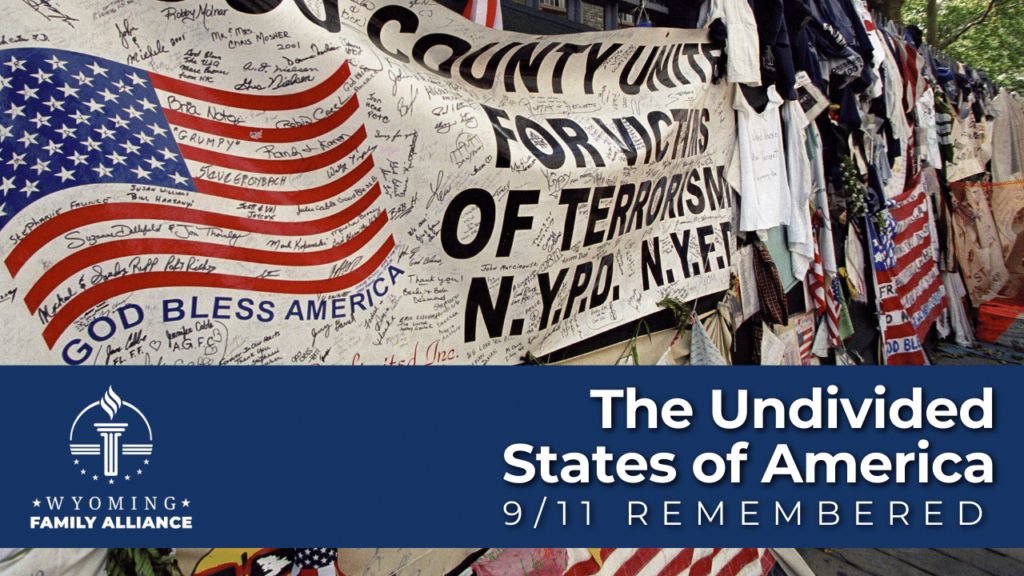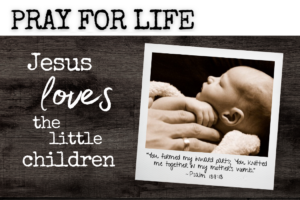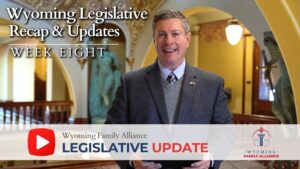By Robin Roberts, Ph.D.
Director of Research for Wyoming Family Alliance
For some of you, the tragedy of 9/11 was a lifetime ago—or more. For me, even 22 years later, I remember it like it was yesterday.
At the time, I was a middle school teacher, and instead of holding class as usual, I had my students watch history unfold in front of the library’s television. I wanted them to make a memory that would last a lifetime and, in some small way, participate in it. As they sat somberly on the floor with eyes glued to the large screen, I told them that someday, their grandchildren would ask about their experience.
Never Forgotten
I remember asking my own parents and grandparents about a similar day—Pearl Harbor Day, when the Japanese attacked Pearl Harbor on December 7, 1941, and dragged the United States into World War II. The strength of their vivid memories and powerful emotions as they recalled their experiences has never left me. In a strange way, I felt almost cheated by the fact that I hadn’t had the privilege of being alive for such a world-changing event.
On 9/11 I was faced with my own Pearl Harbor moment, and I wanted my students—and their children and grandchildren—to share what my parents and grandparents had shared.
Links Among Loss
On the surface, similarities between the two events are few, but underneath they share several important characteristics. The most obvious is that an outside force attacked us on American soil and did so in a way that every American took personally in some fashion. And the loss of life was similar: 2,977 people died on 9/11, and 2,403 people perished on December 7th.
In both cases, important American icons were destroyed. On 9/11 the World Trade Center—a visual symbol of American Capitalist power—was brought to the ground. On December 7th, the American Pacific fleet—the symbol of American power in the Pacific—was sent to the bottom of the harbor.
America was surprised on both days, partly because we underestimated our enemies and were unwilling to believe anyone would be so foolish as to attack us.
In 1941, Americans didn’t view the Japanese military as a serious threat. In hindsight, there was ample warning to have divined Japan’s intent and to prepare a reception that would have left the Japanese with no choice but to surrender. Instead, they proved themselves a capable and dangerous foe and it took us 3 and ½ years to defeat them.
On 9/11 a terrorist group little-known to the public pulled off a stunningly conceived attack that should have been averted, except for the inability of our leaders to seriously consider them a threat. With previous attempts by al-Qaeda and outright threats by Osama bin Laden, our security forces should have been cued to closely watch them.
United We Stand
Another similarity that is, in my mind, far more important, is the resolve and unity that Americans showed in response to being attacked.
In the 1940s, every man, woman, and child stood together, pitched in, and voluntarily sacrificed—in some cases, everything—to unconditionally defeat the enemy. At the end of that conflict, the United States was the most powerful country the world had ever known, stronger after four years of war than it had been prior to it.
With 9/11, the President and leaders of both parties stood united on the Capitol’s steps, resolving to get through the coming days together and ensure this never happened again. This unusual unity didn’t last long, but I remember thinking this is how it should always be.
State of the Union
Today, 22 years later, that war is over, but America is more divided than ever. It seems the United States only comes together when somebody from the outside attacks. Unfortunately, the more divided we become, the more inviting to outside attack we become.
Are we inviting another 9/11 or Pearl Harbor—or something even worse—by dividing ourselves so deeply that one half believes they have nothing in common with the other half, other than both living in the same country?
United Not Divided
While that question may make you feel helpless, here’s something those of you who remember 9/11 can do: Share your memories with your children or grandchildren.
Remind them that they live in the UNITED States of America and not the Divided States of America and that when we are united, there is no power on earth that can stand against us.





